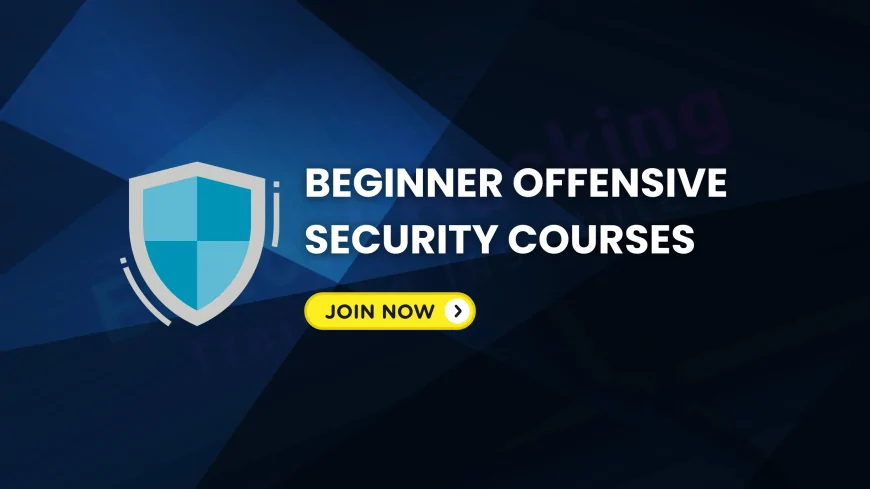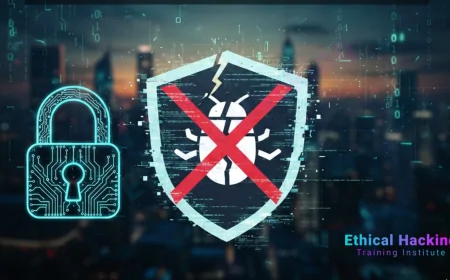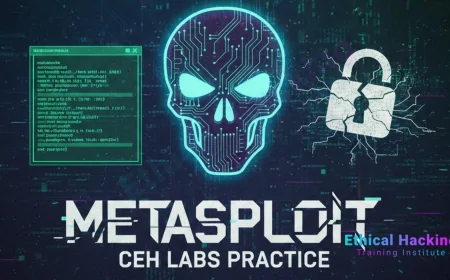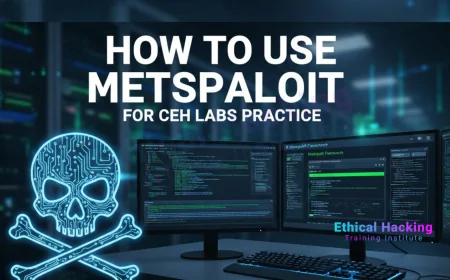Beginner-Friendly Offensive Security Courses to Start Your Cybersecurity Career in 2025
Discover the best beginner-friendly offensive security courses to launch your cybersecurity career. Learn key skills, practical labs, and certification paths for ethical hacking beginners.

Introduction: Why Offensive Security is Key for Cybersecurity Beginners
Starting a career in cybersecurity can be challenging, especially if you are new to the field. Offensive security focuses on ethical hacking and penetration testing—proactively identifying and exploiting system vulnerabilities to strengthen defenses. For beginners, selecting the right courses that balance foundational knowledge with practical skills is essential for building a successful career.
This blog explores the best beginner-friendly offensive security courses, highlighting their content, benefits, and how they prepare you for real-world cybersecurity roles.
What Is Offensive Security?
Offensive security is a proactive approach to cybersecurity where professionals simulate cyberattacks to discover vulnerabilities before malicious hackers exploit them. It involves penetration testing, ethical hacking, vulnerability assessments, and exploitation techniques.
Professionals in this domain help organizations enhance their security posture by identifying weak spots and recommending solutions. This area requires both technical know-how and hands-on experience, making practical training indispensable.
Why Choose Beginner-Friendly Offensive Security Courses?
Starting directly with advanced certifications can be overwhelming for newcomers. Beginner-friendly courses offer:
-
Simplified explanations of core concepts
-
Hands-on practical labs
-
Step-by-step learning paths
-
Mentorship and community support
-
Alignment with industry-recognized certifications
These courses build a strong foundation and prepare you for more advanced training like OSCP (Offensive Security Certified Professional).
Key Beginner-Friendly Offensive Security Courses Overview
| Course Name | Key Topics Covered | Skills Gained | Ideal For |
|---|---|---|---|
| Introduction to Ethical Hacking | Cybersecurity basics, networking, Linux, security tools | Understanding cyber threats, Linux basics, scanning techniques | Absolute beginners |
| Penetration Testing Fundamentals | Reconnaissance, scanning, exploitation, vulnerability assessment | Hands-on pentesting, using Metasploit, report writing | Beginners ready for practical hacking |
| Network Security Basics | Network protocols, attacks, wireless security | Network exploitation, sniffing, MITM attacks | Those interested in network security |
| Web Application Security Basics | Web technologies, OWASP Top 10 vulnerabilities | Web pentesting skills, using Burp Suite, secure coding awareness | Beginners focusing on web security |
| Linux for Security Professionals | Linux commands, permissions, shell scripting | Linux environment setup, using security tools | Those new to Linux and security |
Detailed Breakdown of Beginner Courses
1. Introduction to Ethical Hacking
This foundational course demystifies cybersecurity by introducing basic concepts such as cyber threats, ethical hacking principles, and essential networking knowledge. It covers basic Linux commands and tools like Nmap and Wireshark, enabling learners to understand how attackers scan and map networks.
2. Penetration Testing Fundamentals
After grasping basics, this course teaches practical penetration testing techniques, including reconnaissance, scanning, exploitation, and vulnerability reporting. Learners get hands-on experience with tools like Metasploit and Burp Suite, crucial for entry-level penetration testing roles.
3. Network Security Basics
This course dives into network infrastructure and common network attacks such as Man-in-the-Middle (MITM), sniffing, and denial of service (DoS). It emphasizes practical skills in exploiting network vulnerabilities, an essential area since most cyberattacks target network layers.
4. Web Application Security Basics
Focusing on the most exploited asset in organizations—web applications—this course introduces web technologies and security flaws like Cross-Site Scripting (XSS) and SQL Injection. Using tools like OWASP ZAP, learners practice finding and mitigating web vulnerabilities.
5. Linux for Security Professionals
Linux knowledge is fundamental for offensive security professionals. This course teaches essential Linux commands, scripting, file permissions, and how to install and configure security tools in Linux-based environments.
Benefits of Hands-On Labs and Practical Training
Theory is not enough in offensive security. Practical labs offer:
-
Realistic environments to practice hacking safely
-
Exposure to real-world vulnerabilities and attack scenarios
-
Preparation for certification exams with practical components
-
Confidence through repeated practice and mastery
Tips for Selecting the Best Beginner-Friendly Offensive Security Course
-
Look for comprehensive curricula covering basics and practical labs.
-
Check for experienced instructors who provide clear explanations and mentorship.
-
Evaluate course flexibility for self-paced or online learning.
-
Prefer courses aligned with recognized certifications like OSCP or CEH.
-
Consider student support and community access for doubts and networking.
What’s Next After Beginner Courses?
After mastering beginner courses, students can advance to certifications like:
-
OSCP (Offensive Security Certified Professional): A practical, hands-on penetration testing certification.
-
CEH (Certified Ethical Hacker): Covers comprehensive hacking tools and techniques.
-
Penetration Testing Professional: Advanced exploitation and post-exploitation techniques.
These courses require solid foundational knowledge and practical skills built through beginner-friendly courses.
Conclusion
Embarking on a cybersecurity career through offensive security starts with choosing the right beginner-friendly courses. These courses lay the groundwork for understanding cyber threats and mastering ethical hacking skills through practical training. Focus on programs offering hands-on labs, clear mentorship, and certification alignment to build confidence and competence.
By starting strong, you set yourself on a rewarding path toward becoming a skilled penetration tester or ethical hacker, ready to protect digital assets in today’s cyber threat landscape.
FAQs
What is offensive security?
Offensive security involves proactive techniques like ethical hacking to identify and fix security vulnerabilities before attackers exploit them.
Who should take beginner offensive security courses?
Anyone interested in starting a career in cybersecurity, especially those new to ethical hacking and penetration testing.
Do beginner offensive security courses require coding skills?
Basic scripting knowledge helps, but many courses start from fundamentals and gradually introduce coding concepts.
What topics are covered in beginner offensive security courses?
Topics include networking, Linux basics, scanning, vulnerability assessment, exploitation techniques, and report writing.
How do beginner offensive security courses differ from advanced ones?
Beginner courses focus on foundational concepts and skills, while advanced courses dive deeper into complex attacks and tools.
Are there any prerequisites for beginner offensive security courses?
Some courses recommend basic knowledge of networking and operating systems but many accept absolute beginners.
What certifications can I aim for after completing beginner courses?
Certifications like OSCP (Offensive Security Certified Professional), CEH (Certified Ethical Hacker), and CompTIA Security+.
Can I complete beginner offensive security courses online?
Yes, many reputable online platforms offer beginner courses with flexible schedules and hands-on labs.
How important are hands-on labs in offensive security training?
Hands-on labs are critical as they provide real-world practice in identifying and exploiting vulnerabilities safely.
How long does it typically take to complete a beginner offensive security course?
Duration varies, but many courses range from 4 to 12 weeks depending on study pace and course depth.
Is it necessary to have a technical background to start offensive security?
Not always, but a willingness to learn networking, Linux, and security fundamentals is essential.
What career paths open up after completing beginner offensive security courses?
Roles like penetration tester, security analyst, vulnerability assessor, and ethical hacker.
Are beginner offensive security courses updated regularly?
Reputable courses update their content regularly to include the latest hacking tools and techniques.
What tools will I learn to use in offensive security training?
Common tools include Nmap, Metasploit, Burp Suite, Wireshark, and Kali Linux utilities.
Do these courses cover Linux basics?
Yes, Linux is integral to offensive security, so most courses teach Linux command-line and scripting basics.
Can beginner offensive security courses prepare me for OSCP certification?
Yes, they build foundational skills necessary for advanced certifications like OSCP.
What are the benefits of getting OSCP certified?
OSCP certification is highly respected, demonstrating strong practical penetration testing skills.
Is ethical hacking legal?
Yes, when performed with permission and within legal frameworks, ethical hacking helps improve security.
Can I practice offensive security skills at home?
Yes, using virtual labs and legal penetration testing environments like Hack The Box or TryHackMe.
How do I stay motivated during the course?
Set clear goals, join study groups, and practice consistently with labs and challenges.
What are common challenges beginners face?
Understanding complex concepts, command-line usage, and hands-on exploitation techniques can be initially challenging.
Are there community forums for offensive security learners?
Yes, communities like Reddit, Discord groups, and cybersecurity forums offer support and resources.
Can I learn offensive security part-time?
Absolutely, many online courses allow you to learn at your own pace around your schedule.
What is penetration testing?
Penetration testing is a simulated cyberattack on systems to evaluate their security.
How does offensive security differ from defensive security?
Offensive security focuses on attacking to find weaknesses, while defensive security aims to protect systems.
Are labs included in all beginner offensive security courses?
Most quality courses include labs or practical exercises to apply learned concepts.
How much does beginner offensive security training cost?
Costs vary from free resources to paid courses ranging from hundreds to thousands of dollars.
What resources complement beginner offensive security courses?
Books, online tutorials, video lectures, and cybersecurity blogs enhance learning.
How do I choose the right beginner offensive security course?
Look for updated content, hands-on labs, experienced instructors, and good reviews.
What is the job outlook for cybersecurity beginners with offensive skills?
The demand for cybersecurity professionals, especially those skilled in offensive techniques, is growing rapidly.
What's Your Reaction?
 Like
0
Like
0
 Dislike
0
Dislike
0
 Love
0
Love
0
 Funny
0
Funny
0
 Angry
0
Angry
0
 Sad
0
Sad
0
 Wow
0
Wow
0

















